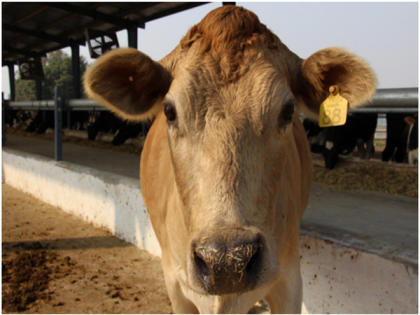Speaking the White Truth - building a better world for dairy and farm animals
By ANI | Published: December 17, 2020 01:57 PM2020-12-17T13:57:26+5:302020-12-17T14:05:02+5:30
International animal welfare organisation, World Animal Protection has today submitted a detailed report to the government of Delhi, comprising the learnings and findings from its 'Better Dairy' campaign.

Speaking the White Truth - building a better world for dairy and farm animals
International mal welfare orgsation, World mal Protection has today submitted a detailed report to the government of Delhi, comprising the learnings and findings from its 'Better Dairy' campaign.
The report titled: The White Truth - Better Dairy Campaign Report, has been submitted to the Chief Minister of Delhi, the Lieutenant Governor of Delhi and the Minister of mal Husbandry, along with other corporate stakeholders.
World mal Protection India started a campaign in 2012 to improve the lives of dairy mals by becoming the voice for these sentient beings.
Over the next eight years, the mal welfare orgsation studied the root causes of mal suffering and worked tirelessly to raise consumer awareness on the cruelty faced by dairy mals.
India is home to over 299 million cattle*, 90 million of whom live in urban and peri-urban areas. Every day, an estimated 50 million dairy mals suffer the worst cruelty as they live in unacceptable conditions in these urban and peri-urban dairies.
* .
They are often confined to large dark rooms without windows or natural light, are permanently tethered with barely any room to move, they lie in their own faeces all day without access to clean water, good quality feed or any healthcare.
In its report, World mal Protection is making key recommendations for corporates, government and other NGO's and advocacy orgsations to take the work forward and continue to fight for the welfare of farm mals.
The recommendations to build back better and move towards a sustainable future for our dairy mals, producers as well as consumers are as follows:
* The 'National Dairy Code' for better management of cows and buffaloes should be recommended to the dairy industry in the country as well all the state governments. The National Code of Practices for Management of Dairy mals in India covers all aspects of the industry - from advice on breeding and husbandry, through to guidance on how mals should be fed and housed. Basic hygiene, station and guidance on record keeping are also included.
* Awareness about welfare of dairy mals and how it will lead to a sustainable dairy industry in our country is necessary.
* Since the urbzation is increasing at a rapid rate in Cities, there is minimal chance that dairy mals can perform their natural behaviour in the cities. Hence, we recommend having a plan where dairies can be moved outside the city limits for a sustainable future for our dairy mals, producers as well as consumers.
"The Better Dairy campaign by World mal Protection has come a full circle. In the past eight years, we have worked with various stakeholders to improve the lives of dairy mals. All of our learnings and highlights of our work have been captured in this report released by World mal Protection. But the work is far from over. Our food systems continue to evolve and we must ensure that mals within our food systems are provided all the welfare needs. It is time for the food systems to have a sustainable business model," said Gajender K Sharma, Country Director, World mal Protection India.
Improved mal welfare leads to improved health: more robust healthier mals, less antibiotic use, and risks of resistance, less labour, especially for women, and improved milk quality and production, leading to better livelihoods.
World mal Protection's vision is to transform the global food system to ensure farm mals live a better life.
This can only be done when farm mals have the means and opportunities to express natural behaviour, room to move and to socialise with others of their own kind, and to feel pleasure. It means freedom from the pain, fear and distress found in factory farms.
This transformation is possible. Some factions of the food industry across the world is responding to the demand for better welfare for farmed mals. We can all play our part by choosing plant-based and high welfare options, eating less meat and demanding a better life for farm mals.
It is time to rethinking how we treat all mals. We must all urgently work together to transform the global food system and end cruel factory farming. Let's do it for mals, for people and for our planet.
This story is provided by NewsVoir. will not be responsible in any way for the content of this article. (/NewsVoir)
( With inputs from ANI )
Disclaimer: This post has been auto-published from an agency feed without any modifications to the text and has not been reviewed by an editor
Open in app